UCMJ Articles
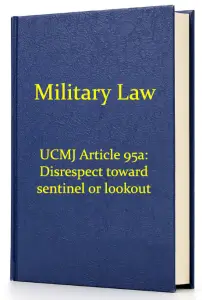
UCMJ Article 95a: Disrespect toward sentinel or lookout
Disrespectful behavior detracts from the respect due to the sentinel or lookout. It may consist of acts or language, however, expressed, and it is irrelevant if the accused referred to the sentinel or lookout while on duty or as a private individual. Disrespect by words may be conveyed by abusive epithets or another contemptuous, derogatory, or denunciatory language.
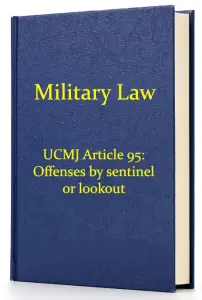
UCMJ Article 95: Offenses by sentinel or lookout
The behaviors specified in Article 95, drunk on the post, asleep on the post, or leaving the post before being relieved, do not apply to those who are not assigned as a sentinel or lookout, nor does it apply to anyone whose duties do not require constant alertness and attentiveness.
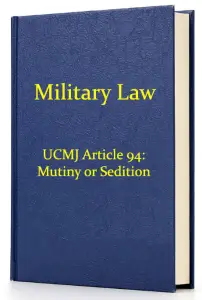
UCMJ Article 94: Mutiny or Sedition
There are two types of mutiny defined in Article 94 but both require an attempt to “usurp or override military authority”.
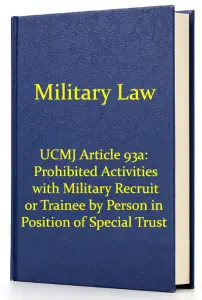
UCMJ Article 93a: Prohibited Activities with Military Recruit or Trainee by Person in Position of Special Trust
The purpose of Article 93a is to protect those recruits or trainees who may be vulnerable to authority figures in a training environment. While military law does allow trainers, recruiters, instructors, and officers a degree of control over those under their supervision, their relationship and behavior must remain appropriate.
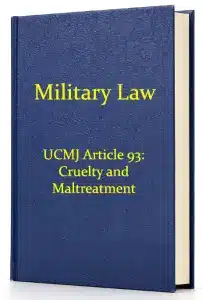
UCMJ Article 93: Cruelty and Maltreatment
The term “any person subject to his orders” protects those not only under the direct or immediate command of the accused but also all persons who, because of some duty, are required to obey the lawful orders of the accused. Those required to follow the legal orders may or may not be subject to the UCMJ.
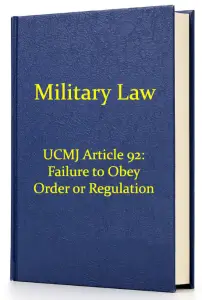
UCMJ Article 92: Failure to Obey Order or Regulation
To be prosecuted for an Article 92 violation of or failure to obey a lawful general order or regulation, the order must have been given by someone with the authority to do so, and the order retained validity after a change of command. The order or regulation must have been lawful and enforceable.
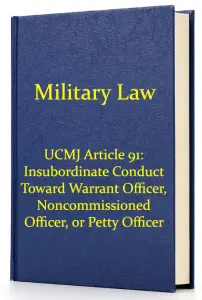
UCMJ Article 91: Insubordinate Conduct Toward Warrant Officer, Noncommissioned Officer, or Petty Officer
The purpose of Article 91 is to protect warrant, noncommissioned, or petty officers from disrespect and violence, as well as to ensure obedience to their lawful orders. To be charged with violating Article 91, the accused knew the victim was a warrant, noncommissioned, or petty officer. The accused must have also struck, assaulted, disobeyed, or disrespected the officer.
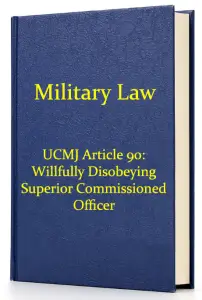
UCMJ Article 90: Willfully Disobeying Superior Commissioned Officer
The MCM states under Article 90 (Willfully Disobeying Superior Commissioned Officer) that any service member may be prosecuted if they willfully and purposely disobey the lawful command of that service member’s superior commissioned officer.
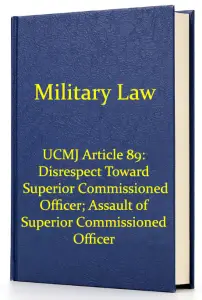
UCMJ Article 89: Disrespect Toward Superior Commissioned Officer; Assault of Superior Commissioned Officer
A military service member may be subject to prosecution for a violation of Article 89 (Assault of a Superior Commissioned Officer) if they strike their superior commissioned officer or draw or lift up any weapon or offer any violence against that officer while the officer is in the execution of the officer’s office.
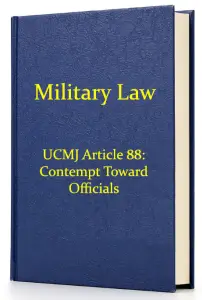
UCMJ Article 88: Contempt Toward Officials
The MCM states any service member may be prosecuted under Article 88 (Contempt Toward Officials) if they use “contemptuous words against the President, the Vice President, Congress, the Secretary of Defense, the Secretary of a military department, the Secretary of Security, or the Governor or legislature of any State, Commonwealth, or possession in which he is on duty or present.”
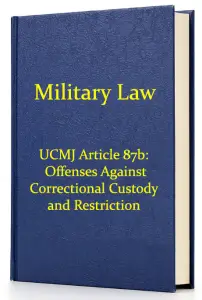
UCMJ Article 87b: Offenses Against Correctional Custody and Restriction
Article 87b of the MCM states a service member may be subject to prosecution if they escape from correctional custody, breach of correctional custody, or breach of restriction.
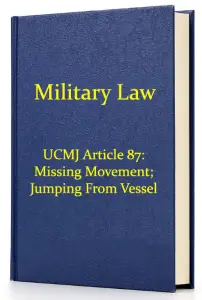
UCMJ Article 87: Missing Movement; Jumping From Vessel
In order to be convicted of a violation of Article 87, the prosecution must prove beyond a reasonable doubt the accused was absent during, “a move, transfer, or shift of a ship, aircraft, or unit involving a substantial distance and period of time.”

